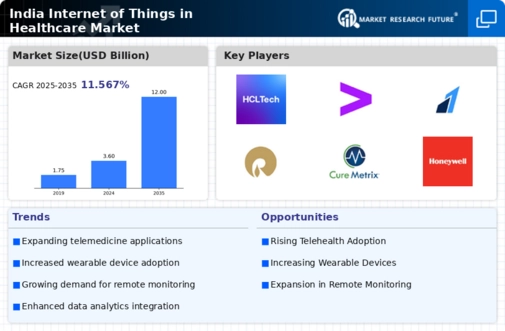Government Initiatives and Support
The Indian government is actively promoting the adoption of technology in healthcare, which significantly impacts the internet of-things-in-healthcare market. Initiatives such as the National Digital Health Mission aim to create a digital health ecosystem that integrates various healthcare services. The government has allocated approximately $1.5 billion for digital health initiatives, which includes funding for IoT-based healthcare solutions. This support not only encourages innovation but also fosters collaboration between public and private sectors. As a result, healthcare providers are increasingly investing in IoT technologies to enhance service delivery and operational efficiency. The government's commitment to improving healthcare infrastructure and accessibility is expected to drive the growth of the internet of-things-in-healthcare market, potentially leading to a 30% increase in IoT adoption among healthcare facilities by 2027.
Growing Focus on Preventive Healthcare
The internet of-things-in-healthcare market is witnessing a growing focus on preventive healthcare in India. This shift is largely influenced by the rising awareness of health and wellness among the population. Preventive healthcare emphasizes early detection and management of health issues, which aligns well with the capabilities of IoT technologies. By utilizing IoT devices, healthcare providers can monitor patients' health metrics continuously, enabling timely interventions and reducing the risk of severe health complications. The preventive healthcare market in India is projected to grow at a CAGR of 18% over the next five years, driven by increasing health consciousness and the adoption of technology. This trend is likely to enhance the demand for IoT solutions, as they provide the necessary tools for effective preventive care, thereby transforming the healthcare landscape.
Technological Advancements in IoT Devices
Technological advancements in IoT devices are playing a crucial role in shaping the internet of-things-in-healthcare market in India. The development of more sophisticated, cost-effective, and user-friendly devices is making IoT solutions more accessible to healthcare providers. Innovations such as wearable health monitors, smart sensors, and connected medical devices are enhancing patient care and operational efficiency. For instance, the market for wearable health devices is expected to grow at a CAGR of 20% over the next five years, driven by increasing consumer awareness and demand for health tracking. These advancements not only improve patient outcomes but also streamline healthcare processes, making it easier for providers to manage patient data and deliver personalized care. As technology continues to evolve, the potential for IoT in healthcare appears to be expanding, indicating a robust future for the market.
Rising Demand for Remote Healthcare Solutions
The internet of-things-in-healthcare market in India is experiencing a notable surge in demand for remote healthcare solutions. This trend is driven by the increasing prevalence of chronic diseases and the need for continuous patient monitoring. According to recent estimates, the chronic disease burden in India is projected to reach 75 million by 2030, necessitating innovative healthcare delivery methods. IoT devices facilitate remote monitoring, allowing healthcare providers to track patient health in real-time, thus improving outcomes and reducing hospital visits. The convenience of remote consultations and monitoring is appealing to both patients and healthcare providers, leading to a projected growth rate of 25% in the adoption of IoT solutions in healthcare by 2026. This shift towards remote healthcare is likely to redefine patient engagement and care delivery in the coming years.
Integration of Artificial Intelligence with IoT
The integration of artificial intelligence (AI) with IoT technologies is emerging as a transformative driver for the internet of-things-in-healthcare market in India. AI enhances the capabilities of IoT devices by enabling advanced data analytics, predictive modeling, and personalized healthcare solutions. This integration allows healthcare providers to derive actionable insights from vast amounts of patient data collected through IoT devices. For instance, AI algorithms can analyze patient health trends and predict potential health risks, facilitating proactive care. The market for AI in healthcare is expected to grow significantly, with estimates suggesting a CAGR of 30% over the next five years. This synergy between AI and IoT is likely to revolutionize patient care, improve operational efficiencies, and foster innovation in healthcare delivery, thereby propelling the growth of the internet of-things-in-healthcare market.




















Leave a Comment